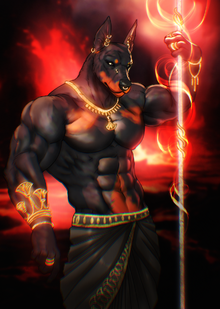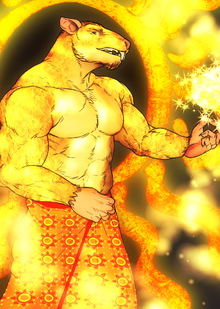More actions
No edit summary |
|||
| Line 10: | Line 10: | ||
Baskarr is a religion centered around the concept of Ma’at which is loosely translated to Karma in Common. Ma’at is the golden rule of the world to Baskarr, one that divines world order, peace, stability, hierarchy correctness and justice. The idea is that one will receive back what one does upon others, or that one will inflict back on others what has been inflicted on them. Everything that happens in the world to any person is deterministic because of what this person has done prior in their life, the sum of their actions, thoughts, emotions wants and needs, and how the Gods arbitrate this process. The term Baskarr itself means Origins in the old Dewamenet language. While Ma'at would imply a deep pacifist community, the Asha is anything but. The second core tenet of Retribution is a strong theme in their religion, though perhaps not in the way one would expect. Retribution to the Baskarr faithful is the idea of Justice, and enacting justice (no matter how violent, on for example the Elves) is a form of kindness and compassion to cleanse even non-believers of the stain of sin and tyranny from their soul. The injustices that Baskarr worshipers care most about, is slavery, genocide, and taking the lives of others, but they are also equally capable of condemning whole societies for the crimes of a few, and have this be justified in their religion. A person can make amends for evil deeds, or be inflicted retribution upon their soul by others, thus correcting any imbalances of sin and virtue. When a Soul passes to the Afterlife, which is called the Duat, the gods weigh the soul’s value against that of a feather, which is said to weigh near zero when it comes to Ma’at. Those who have sinned a lot have heavy souls, while those with good Ma’at have lighter souls, thus making the feather heavier. Those with heavy souls are rejected and sent back to [[Aloria]], condemned to live the life of a diminutive animal before they may be reborn a second time into an Asha to try again. Even though they are burdened souls, repentance as a domestic or wild animal is considered holy repentance, and to kill such an animal is considered a grave crime against the Gods. Souls that are deemed light enough to stay in Dauat are given their own boat and sent sailing on the eternal ocean. It is said that the Dauat is an eternally calm ocean under a perfectly lit starry night sky, where the souls of those deemed worthy sail forever without need or want, and able to visit the boats of their friends and loved ones, as well as pets. Because pets go to the Dauat automatically (domestic animals cannot commit sins), it is believed that those who are condemned to be reincarnated as a dog or a cat will automatically pass to the Dauat once their repentance is up. Here is a list of all Holy Animals of the Baskarr Faith: Domestic Cats, Domestic Canines, Otters, Beavers, Horses, Rats, Rabbits, Mice, Ferrets, Deer, and Bears. | Baskarr is a religion centered around the concept of Ma’at which is loosely translated to Karma in Common. Ma’at is the golden rule of the world to Baskarr, one that divines world order, peace, stability, hierarchy correctness and justice. The idea is that one will receive back what one does upon others, or that one will inflict back on others what has been inflicted on them. Everything that happens in the world to any person is deterministic because of what this person has done prior in their life, the sum of their actions, thoughts, emotions wants and needs, and how the Gods arbitrate this process. The term Baskarr itself means Origins in the old Dewamenet language. While Ma'at would imply a deep pacifist community, the Asha is anything but. The second core tenet of Retribution is a strong theme in their religion, though perhaps not in the way one would expect. Retribution to the Baskarr faithful is the idea of Justice, and enacting justice (no matter how violent, on for example the Elves) is a form of kindness and compassion to cleanse even non-believers of the stain of sin and tyranny from their soul. The injustices that Baskarr worshipers care most about, is slavery, genocide, and taking the lives of others, but they are also equally capable of condemning whole societies for the crimes of a few, and have this be justified in their religion. A person can make amends for evil deeds, or be inflicted retribution upon their soul by others, thus correcting any imbalances of sin and virtue. When a Soul passes to the Afterlife, which is called the Duat, the gods weigh the soul’s value against that of a feather, which is said to weigh near zero when it comes to Ma’at. Those who have sinned a lot have heavy souls, while those with good Ma’at have lighter souls, thus making the feather heavier. Those with heavy souls are rejected and sent back to [[Aloria]], condemned to live the life of a diminutive animal before they may be reborn a second time into an Asha to try again. Even though they are burdened souls, repentance as a domestic or wild animal is considered holy repentance, and to kill such an animal is considered a grave crime against the Gods. Souls that are deemed light enough to stay in Dauat are given their own boat and sent sailing on the eternal ocean. It is said that the Dauat is an eternally calm ocean under a perfectly lit starry night sky, where the souls of those deemed worthy sail forever without need or want, and able to visit the boats of their friends and loved ones, as well as pets. Because pets go to the Dauat automatically (domestic animals cannot commit sins), it is believed that those who are condemned to be reincarnated as a dog or a cat will automatically pass to the Dauat once their repentance is up. Here is a list of all Holy Animals of the Baskarr Faith: Domestic Cats, Domestic Canines, Otters, Beavers, Horses, Rats, Rabbits, Mice, Ferrets, Deer, and Bears. | ||
===Divine Mechanics=== | ===Divine Mechanics=== | ||
All Religions provide 1 single Mechanic to their Believers that fits within the flair of their Religion. This Mechanic is lost if the individual | All Religions provide 1 single Mechanic to their Believers that fits within the flair of their Religion. This Mechanic is lost if the individual stops believing in the Religion, or becomes a heretic, but can be regained. Afflicted can use this mechanic, but having the mechanic does not imply that they have blanket forgiveness from their Gods, just that there is more nuance to it than that. | ||
* Baskarr Faithful (even if non-Asha) gain access to Living Metal (a liquid metallic substance that can imitate organic functions and be moved like water by its owner, or solidify in desired shapes), which is now capable of developing a will of its own. If they should die before it is their time (as arbitrarily dictated by the Gods), then their Soul and mind is transported into the Living Metal, which produces a whole new body for them out of Living Metal, which imitates their previous body, but in a more metallic form. Additionally, Living Metal can develop a will of its own while on their owner's body, and express sentiments or feelings independently of the owner's will, but will always subject to the owner's commands when given. | * Baskarr Faithful (even if non-Asha) gain access to Living Metal (a liquid metallic substance that can imitate organic functions and be moved like water by its owner, or solidify in desired shapes), which is now capable of developing a will of its own. If they should die before it is their time (as arbitrarily dictated by the Gods), then their Soul and mind is transported into the Living Metal, which produces a whole new body for them out of Living Metal, which imitates their previous body, but in a more metallic form. Additionally, Living Metal can develop a will of its own while on their owner's body, and express sentiments or feelings independently of the owner's will, but will always subject to the owner's commands when given. | ||
Revision as of 22:10, 3 March 2024
| Baskarr | |
|---|---|
 | |
| Religion | |
| Pronunciation | Bas-Car |
| Origins | Dewamenet |
| Deities | |
Origins
Baskarr, or the Faces of Baskarr as it is more commonly called, is a Religion primarily worshiped by the Asha and Feka Asha, dating back all the way to the Dewamenet Empire. As a result, Baskarr is one of the oldest, if not the oldest, continually worshiped religion for tens of thousands of years. However, because of the Dewamenet-Allorn War, and the subsequent enslavement of the Asha to the Allorn, it is generally assumed in the modern era that what is modern Baskarr is not the same as Dewamenet Baskarr, with aspects of the religion and nuances lost to time and Nelfin interference. The religion survived through word of mouth in enslaved communities, and after tens of thousands of years of separation, small differences and changes converged into new beliefs and concepts. As such, while it is perhaps the oldest continually worshiped religion, it is also an incredibly unstable religion that habitually experiences radical changes as ancient Dewamenet history and legacy is unearthed in the modern era.
Core Beliefs
Baskarr is a religion centered around the concept of Ma’at which is loosely translated to Karma in Common. Ma’at is the golden rule of the world to Baskarr, one that divines world order, peace, stability, hierarchy correctness and justice. The idea is that one will receive back what one does upon others, or that one will inflict back on others what has been inflicted on them. Everything that happens in the world to any person is deterministic because of what this person has done prior in their life, the sum of their actions, thoughts, emotions wants and needs, and how the Gods arbitrate this process. The term Baskarr itself means Origins in the old Dewamenet language. While Ma'at would imply a deep pacifist community, the Asha is anything but. The second core tenet of Retribution is a strong theme in their religion, though perhaps not in the way one would expect. Retribution to the Baskarr faithful is the idea of Justice, and enacting justice (no matter how violent, on for example the Elves) is a form of kindness and compassion to cleanse even non-believers of the stain of sin and tyranny from their soul. The injustices that Baskarr worshipers care most about, is slavery, genocide, and taking the lives of others, but they are also equally capable of condemning whole societies for the crimes of a few, and have this be justified in their religion. A person can make amends for evil deeds, or be inflicted retribution upon their soul by others, thus correcting any imbalances of sin and virtue. When a Soul passes to the Afterlife, which is called the Duat, the gods weigh the soul’s value against that of a feather, which is said to weigh near zero when it comes to Ma’at. Those who have sinned a lot have heavy souls, while those with good Ma’at have lighter souls, thus making the feather heavier. Those with heavy souls are rejected and sent back to Aloria, condemned to live the life of a diminutive animal before they may be reborn a second time into an Asha to try again. Even though they are burdened souls, repentance as a domestic or wild animal is considered holy repentance, and to kill such an animal is considered a grave crime against the Gods. Souls that are deemed light enough to stay in Dauat are given their own boat and sent sailing on the eternal ocean. It is said that the Dauat is an eternally calm ocean under a perfectly lit starry night sky, where the souls of those deemed worthy sail forever without need or want, and able to visit the boats of their friends and loved ones, as well as pets. Because pets go to the Dauat automatically (domestic animals cannot commit sins), it is believed that those who are condemned to be reincarnated as a dog or a cat will automatically pass to the Dauat once their repentance is up. Here is a list of all Holy Animals of the Baskarr Faith: Domestic Cats, Domestic Canines, Otters, Beavers, Horses, Rats, Rabbits, Mice, Ferrets, Deer, and Bears.
Divine Mechanics
All Religions provide 1 single Mechanic to their Believers that fits within the flair of their Religion. This Mechanic is lost if the individual stops believing in the Religion, or becomes a heretic, but can be regained. Afflicted can use this mechanic, but having the mechanic does not imply that they have blanket forgiveness from their Gods, just that there is more nuance to it than that.
- Baskarr Faithful (even if non-Asha) gain access to Living Metal (a liquid metallic substance that can imitate organic functions and be moved like water by its owner, or solidify in desired shapes), which is now capable of developing a will of its own. If they should die before it is their time (as arbitrarily dictated by the Gods), then their Soul and mind is transported into the Living Metal, which produces a whole new body for them out of Living Metal, which imitates their previous body, but in a more metallic form. Additionally, Living Metal can develop a will of its own while on their owner's body, and express sentiments or feelings independently of the owner's will, but will always subject to the owner's commands when given.
Gods and Goddesses
Baskarr has the so-called Faces of Baskarr. The Faces refer to each of the Gods, though at this point it is fairly clear that many of the Gods have been lost to time, and some Gods have been historically re-imagined. The new and modern re-discovered Gods are identified through the new format, while the old ones are present in the old God format.
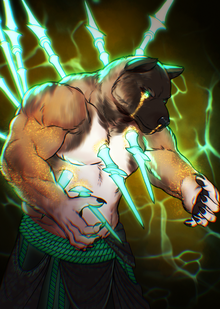
|
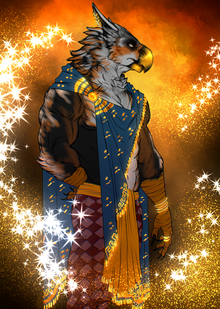
|
Yah, Lady of the Heavens
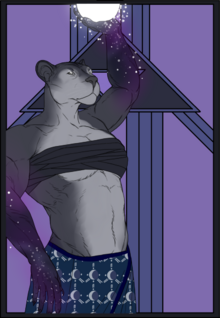 |
|
Ankh, Hands without Forgiving
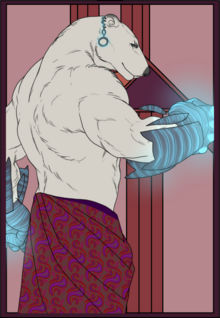 |
|
Wadj, Gaze upon Infinity
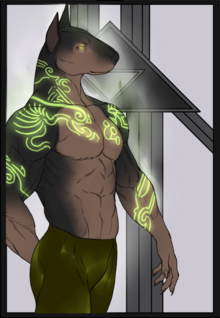 |
|
Ra’mut, Guidance of Wayfarers
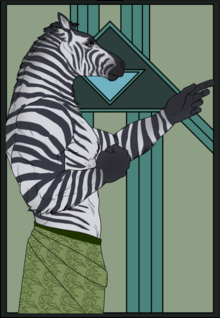 |
|
Priesthood
Baskarr does not have a priestly hierarchy like Unionism or Estellon, but that does not mean it has no priests at all. Rather, priests are called Diviners, because their task is not so much to preach, but to try and interpret the life-signs or words of the Gods provided to the faithful. While many faithful could live their whole lives without seeing a God once, the actions of the gods can still be interpreted in the world around them. Furthermore, Baskarr Diviners offer social services, a form of therapy for those who have had evil actions inflicted on them, but also to offer advice on how to enact retribution, or practice forgiveness, depending on what the person seeking help wants. To become a Baskarr Diviner, one does not need any formal training, one simply decides to be one. It is usually required however for the Diviner to wear the Satoor in exact design of the god or goddess they primarily represent, with Wadj having some more freedom (or, if the person refuses to wear Elastan, to wear a pure-black Satoor). Baskarr Temples are also fairly informal because worship is a more personal arrangement. Still, a matter of public acknowledgement of the gods has some value, and as such, shrines with statues of the Faces can be found in all major Asha population centers.
Trivia
- The Faces of Baskarr have the misfortune of frequently being misgendered by outsiders due to their large-leaning physical appearance, and because some of them have gender identities different than their appearance, or because they take more appearance traits of the opposite gender.
- It is well understood that a lot of the nuance of the faith is not understood because the pantheon is incomplete. It is for example possible that the relation between Akhet and Yah is very different, if Yah’s husband god was supposedly found. Many Baskarr faithful disregard this potential reality for now, under the assumption they will correct their beliefs when new information is brought to light.
- There is a constant information war going on between the Allorn Empire and the Ashal States. The Ashal States fund research and excavations into historical sites, but Estellon fundamentalists are well known to enact acts of terrorism on these historical sites as a continuation of erosion of Asha identity. The Allorn revanchists benefit from mitigating Asha nationalism, as millions of Asha are still enslaved in the Allorn and Dread Empire.
| ||||||||||
| Accreditation | |||||||||
|---|---|---|---|---|---|---|---|---|---|
|
| ||||||||
